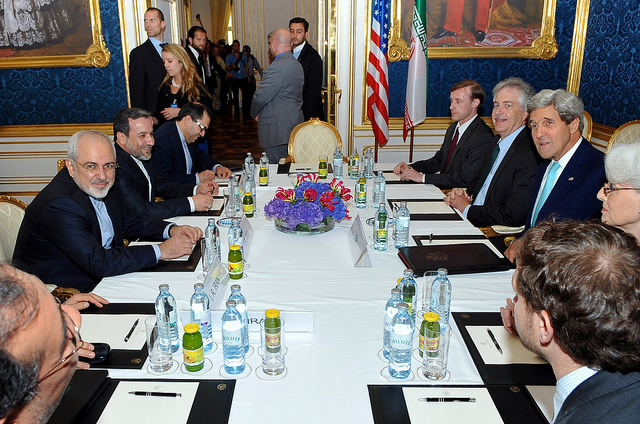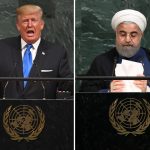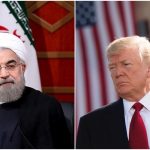by Shireen T. Hunter
Another round of negotiations between world powers and Iran on its nuclear program ended without any agreement in sight last week in New York. Many causes for the failure to reach an agreement have been cited, including: the number of centrifuges Iran should be allowed to keep; the still ambiguous status of the Arak heavy water reactor; the few remaining unanswered questions posed by the International Atomic Agency (IAEA) to Iran; and last but not least, the question of when and how much of the sanctions imposed on Iran will be lifted, whether they will be lifted at all, or, as put by US negotiator Wendy Sherman, they will simply be suspended.
All of these issues have certainly impeded a comprehensive agreement. However, they are not the ultimate causes of the failure of the negotiations thus far. Nor is Iran’s nuclear program per se the reason for the tensions in its relations with the West. In fact, the dispute between the West and Iran’s nuclear program is just a symptom of more fundamental disagreements between the two, or, to put it more correctly, between hardliners within Iran and the West.
The real causes of the failure of the negotiations between Iran and the P5+1 [US, UK, Russia, France, China, plus Germany] can be summarized as follows.
1. Divergent understanding of what non-proliferation is all about. An underlying problem between Iran and the P5+1 is that Iran sees the non-proliferation issue as a technical and legal question that can be resolved by working out the proper legal and technical solutions. Yet, both historically and today, as with any other arms limitation process, non-proliferation has never been primarily about technicalities. Rather it has always been about power and about securing and then locking in a balance of power that favors one side. In other words, a country or group of countries that have enjoyed military superiority have tried to freeze this balance and thus keep their advantage, whereas those in a less favorable position have opposed such measures until they could reach a more favorable balance of power before agreeing to any freeze.
In the case of Iran, the goal of the West and Iran’s Middle Eastern neighbors is to ensure that Iran would at no time have the capability to disrupt the regional balance of power. This is neither a new phenomenon nor is it solely nuclear-related. A sharp improvement in Iran’s conventional military power would also be viewed with alarm. Even when, under the Shah, Iran was a Western ally and while the Soviets were arming Saddam Hussein to the teeth, there were calls in the US by influential politicians to stop arms sales to Iran.
The nuclear issue is therefore just part of Iran’s containment, as are the sanctions. The dispute has allowed Western powers, as well as China and Russia, to impose sanctions on Iran to severely undermine its economy while sapping its people’s energies and creating social tensions with the aim of implosion and political change. China and Russia may not be interested in a political implosion in Iran, but they certainly prefer a moribund Iran, which they can flood with their goods and manipulate to their own ends.
2. Iran’s regional policies and its anti-imperialist rhetoric. The most important impediment to any agreement with Iran is its posture on the Arab-Israeli conflict, and especially its hostility towards Israel. Otherwise, why has there been no Western effort to rein in Pakistan’s nuclear weapons arsenal, which has been growing at a tremendous pace? If the risk of proliferation is a major concern, why has this concern not applied to Pakistan? This has largely been because Pakistan, despite its Islamic pretensions, does not interest itself in the Palestinian problem. In all other regions, Iran has pursued a pragmatic and even concessional policy towards its neighbors; but it has so far refused to openly and unequivocally change its posture on the Arab-Israeli conflict. It is hard to believe that any agreement can be reached with Iran before it is acceptable to Israel, and this is unlikely until some change has occurred in Iran’s approach. However, short of the dramatic act of recognizing Israel, today no softening of Iran’s tone will be sufficient for Israel or at least for its hawks. This is so because Iran has come to justify many of the strategies of Israel and other regional countries.
At the international level, Iran cannot hope to be treated as a full-fledged member of the community of states, while simultaneously calling for its fundamental disruption, even if Iran’s efforts have generally been limited to rhetoric. It is therefore difficult to see how there can be an understanding between Iran and the West until Iran stops its so-called anti-Imperialist crusade and pursues its efforts to reform a decidedly unjust international system through more accepted methods.
3. The Iranian threat as the excuse for many policies. The sad truth is that in the post-Soviet world, many countries have used the so-called Iranian threat to achieve a range of objectives. For regional countries, these objectives include justifying their value to the West and receiving financial and military support. Meanwhile, in Western countries, some entities use the Iranian threat to ask for more defense spending and to promote arms sales to regional countries. For all of these players, Iran’s return to the international community would leave them with an enemy vacuum. So they will do all they can to prevent this from happening.
4. The conflict with the West as an instrument of domestic politics in Iran. Meanwhile, in Iran too differences with the West, especially the US, have served to sustain a particular vision of what Iranian society and polity should be, and to serve the parochial interests of certain political groups and economic cliques, which benefit from the current conditions and enrich themselves while the country’s problems mount. Any reaching of a modus vivendi with the West would deprive them of their power and of their golden goose. Moreover, the cultural conservatives fear that Iran’s opening up to businesses, tourists and other exchanges would affect the country’s cultural dynamics and undermine their power base.
5. A more long-term Iranian question. Beneath all these issues lies a more fundamental cause of friction between Iran and the global powers, which is endemic to middle-sized powers, especially in geopolitically sensitive regions. Since the time of the Greeks and the Persians, the West has had an ambivalent view of Iran, both admiring and despising it. In more recent history, the West’s approach toward Iran was essentially developed by Britain and was based on the idea of keeping Iran “moribund”—alive enough to serve as a potential buffer but not strong enough to pose a challenge. The US has essentially pursued this British policy towards Iran.
This view of Iran today is reflected in Western demands that Tehran help defeat the radical group that calls itself the Islamic State (aka ISIS, ISIL or IS) while having no say in Iraq or Syria or Afghanistan—an unrealistic and unreasonable standard. The West and other big powers should decide what kind of Iran they could live with. Can they handle a progressive but strong and assertive Iran? Or is any kind of strong Iran unacceptable? If the latter is the case, then there is no chance that sanctions will be lifted. If the purpose were primarily to try moving Iran toward openness domestically and a more cooperative stance in the region, then pressures on it should have been eased long before now. It is sobering to reflect that the sanctioning of Iran gathered speed when reformist and pragmatic politicians were in power. While pressuring measures have likely helped push Iran to the bargaining table over its nuclear program, within Iran these pressures have so far only emboldened conservatives.
6. The Onus is on Iran. Every state is responsible for safeguarding its own interests and should not expect others to carry out its aims. Thus Iran’s leaders must now decide what they value most: the country and its people, some vague revolutionary objective, or, even less nobly, their own parochial interests. Life is not fair and international politics are particularly brutal, especially for the less powerful. Bemoaning this state of affairs and calling the system unjust will not get Iran anywhere. Its leaders have to grow wise and protect first and foremost their own country and people. Only then should they think about trying to reform the international system and liberate the oppressed!






The US was happy to sell immense quantities of weapons to Iran under the Shah. Even though this rattled the Gulf monarchies to some extent. Reason? Iran was not hostile toward Israel.
For one thing, Iran has all the right to push on with its research on Atomic matters except development of Nuclear bomb and obey the NPT. The fact that Iran should give in to USA and Israel’s constant lobbying in the US congress and senate is absolutely absurd; where as other 5+1 Nations are simply waiting for US’s approval; this is insane. Iran is now in excellent position to accept within reason to stop some of its questionable activities, and comply within NPT boundaries; and is constantly trying to submit within reason to 5+1 to the path of world peace.
One thing to remember is to understand that even though the negotiations is progressing, but back in Iran the fanatic hardliners are against these talks, and 5+1 should take this unique opportunity to come up with some creative ways to resolve this issue once for all.
Iran should do what Israel does, both directly and through US proxies: pump out popular culture propaganda. Produce films, write pop fiction novels and screen plays, take control our Iran’s own cultural legacy, talents and future.
Christian zionists think Tim LeHaye’s “Left Behind” series was gospel; thousands maybe millions of American await the Rapture.
Dan Silva pens a series about Israeli Jewish superman that is the equal of LeHaye’s “Left Behind.” Silva’s work normalizes hating Iran and even attacking Iran with nuclear weapons; killing with no more process than Jewish Israelis say so; and vast, global manipulations for the benefit of Always Moral Israel and the detriment of Muslims, Arabs, and Iranians.
Turnabout is fair play.
Let’s see some popular fiction that tells the truth about zionism, and targets Israelis and Jews in the same way as Iranians, Egyptians, Arabs, Muslims are lied about, tortured and killed in Silva’s hasbaric popular fiction.